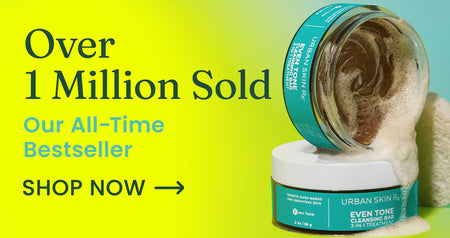The 411 on Hydroquinone: Is It Safe?

When it comes to skincare, we’re willing to try just about anything to give us a glow. But, what’s the buzz on hydroquinone and why is it considered controversial? Well, we’re here to answer all questions in regards to this ingredient.
What Is Hydroquinone?
Hydroquinone is a topical fading ingredient that can be very helpful in treating dark spots and hyperpigmentation.
While everyone has unique skin care needs, let's face it, there are some ailments that need a bit more care and attention to combat. If you are someone who deals with dark spots, hyperpigmentation or scarring from past acne, your skincare products are extra important.
Having the right skincare products for your unique specifications and needs make all the difference. If you have skin that requires a higher level of need than your typical routine of cleansing, exfoliation, brightening cream and a serum rich in Vitamin C or antioxidants, then you have likely been alerted to Hydroquinone.
Hydroquinone is a chemical compound that has been used in skincare as we’ve mentioned, and even photo-developing. This vast chemical interacts with cells that produce melanin (what gives your skin pigmentation) and therefore helps lighten dark areas.
It might sound easy, peasy, 1,2,3 — but Hydroquinone is not without it’s side effects when used improperly or in excess.
How Does Hydroquinone Work?
Hydroquinone is found in a variety of creams, serums, cleansers, moisturizers and skin-lightening products. This topical treatment has been used to treat many skin conditions such as melasma, freckles and even sunspots.
Using Hydroquinone in conjunction or in addition to your skincare routine may help your complexion dramatically. Hydroquinone may also help treat redness or darkening from an acne breakout or after an injury. Hydroquinone lightens dark areas and promotes an even, glowing complexion.
The main benefits of Hydroquinone are its ability to lighten hyperpigmentation, even out skin tone and soften spots brought on by age.
Hydroquinone contains depigmenting properties that make for an effective ingredient in lightening skin due to a variety of reasons including scarring and marks on your face. Hydroquinone is absorbed quickly by the skin, so the product is maximized.
What Are the Side Effects of Hydroquinone?
You’ve probably heard some controversy circulating around Hydroquinone. The fact is, Hydroquinone is not for everyone. Though an effective tool in reducing the appearance of hyperpigmentation, it’s important to be aware of the potential side effects of Hydroquinone.
However, there isn’t any research that supports Hydroquinone being dangerous, it’s FDA approved and is still a great ingredient to use when treating skin.
Hydroquinone is quite potent, so being aware of potential side effects is definitely something to look into. Side effects may include:
- Mild skin irritation, dryness, redness
- Halo spots around the treated areas - as Hydroquinone lightens dark spots, it may also lighten those spots surrounding areas
How to Use Hydroquinone
Hydroquinone can be used once a day, usually at night until you notice lightening on the skin of the applied area. It works well with a variety of ingredients, but is considered most effective when used with the cortisone, Tretinoin. A dermatologist will recommend the amount of Hydroquinone or Tretinoin based on your needs.
You should use Hydroquinone with a daily SPF 30 or higher, and we recommend minimizing sun exposure while using. Speak with your dermatologist on how long you should be using the product, it will vary upon the person.
Who Should Use Hydroquinone
Anyone with any skin type could use Hydroquinone, but really, those with sensitive skin should probably avoid it. In general Hydroquinone is used to treat dark spots, so if you don’t have any, it’s probably best to use other types of skincare products.
Why is This Ingredient Controversial?
The FDA recognized Hydroquinone as safe and effective in 1982. Years later some safety concerns came to light in the case of accidental ingestion. Scientists discovered that ingesting Hydroquinone caused carcinogenic qualities in lab rats; however, the cancer-causing properties have yet to be proven in humans.
Today it is still one of the most popular ingredients recommended by dermatologists in fighting stubborn hyperpigmentation.
Due to the drama, more and more retailers are pushing back on carrying products with Hydroquinone and consumers are wanting alternatives that offer the same results.
Meet our new Advanced Eventone Day and Night Treatment featuring Tranexamic Acid. Tranexamic Acid is a synthetic derivative of the amino acid lysine, and works to reduce the appearance of scarring, splotchy or dark spotted areas of your skin.
Tranexamic Acid: An Overview
As with any new skincare product, consider doing a patch test. Though Tranexamic Acid is considered safe for all skin types, make sure it’s right for you by trying it on a small area first. Tranexamic Acid products work well in conjunction with Vitamin C, SPF, Hyaluronic Acid and Retinol.
Tranexamic Acid is known primarily for its ability to brighten skin to a glowing complexion and aid in treating dark spots and discoloration.
Licensed Aesthetician and Urban Skin Rx® Founder, Rachel Roff, stated, “I have been using Hydroquinone for over 10 years and still love the ingredient. I have chatted with many dermatologists and they all still love the ingredient as well and think it’s gotten a bad rap for an unjustified reason.
But luckily, there are great alternatives to Hydroquinone like Tranexamic Acid, because at the end of the day, all I care about is that our customers are happy and are seeing results with their skin.”
How To Fade Acne Scars if You Have Sensitive Skin
Acne will swell and break down the walls of your pores. When the contents of a blemish spill into surrounding tissue it will cause a deeper scar. Types of scarring include:
- Hyperpigmentation (dark mark or red mark)
- Hypopigmentation (white mark)
- Hypertrophic scars (indentation or hole in the skin, and Hypertrophic scars (keloid or raised scar)
When it comes to preventing scarring in the first place, preventing acne is the place to start, by developing a consistent skincare schedule that works for your unique complexion.
In general, washing and moisturizing twice a day, making sure to wash your makeup brushes and pillow cases and using tested ingredients that will prompt an even, glowing complexion.
Though a preventative approach is most ideal, sometimes acne is pesky! If it’s persistent no matter what you do, remember:
- Don’t pick! Picking will only lead to scarring, and prolong the healing process of your skin.
- Use a regimen with exfoliating and antibacterial ingredients, using an exfoliating pad and Benzoyl Peroxide, or starting with this all in one value kit to get you started.
- Hydrate so skin doesn’t become irritated or dehydrated and produce more oil. Hyaluronic Acid is a powerhouse ingredient in this regard!
- Wear SPF so scars don’t worsen and take longer to fade, while also protecting your skin from harsh UV rays that could trigger hyperpigmentation or dark spotting.
If you already have scarring, you can help fade it using the following methods:
- Red LED Light Therapy
- Bakuchiol a few nights per week can
- Microneedling from a licensed aesthetician
The Bottom Line
Hydroquinone is an ingredient commonly found in a variety of skincare products like creams, lotions, serums and products intended to improve your skin. Hydroquinone can be used to reduce the appearance of dark spots and hyperpigmentation on certain areas of the body, and it is considered to be generally safe.
This ingredient may cause certain side effects, like mild skin irritation, for some users, so it is best to proceed with caution until you are more familiar with the way your skin reacts to the product. Combining the use of hydroquinone with other methods of caring for your skin may give you the greatest results, and your skin will thank you for all the extra TLC.


